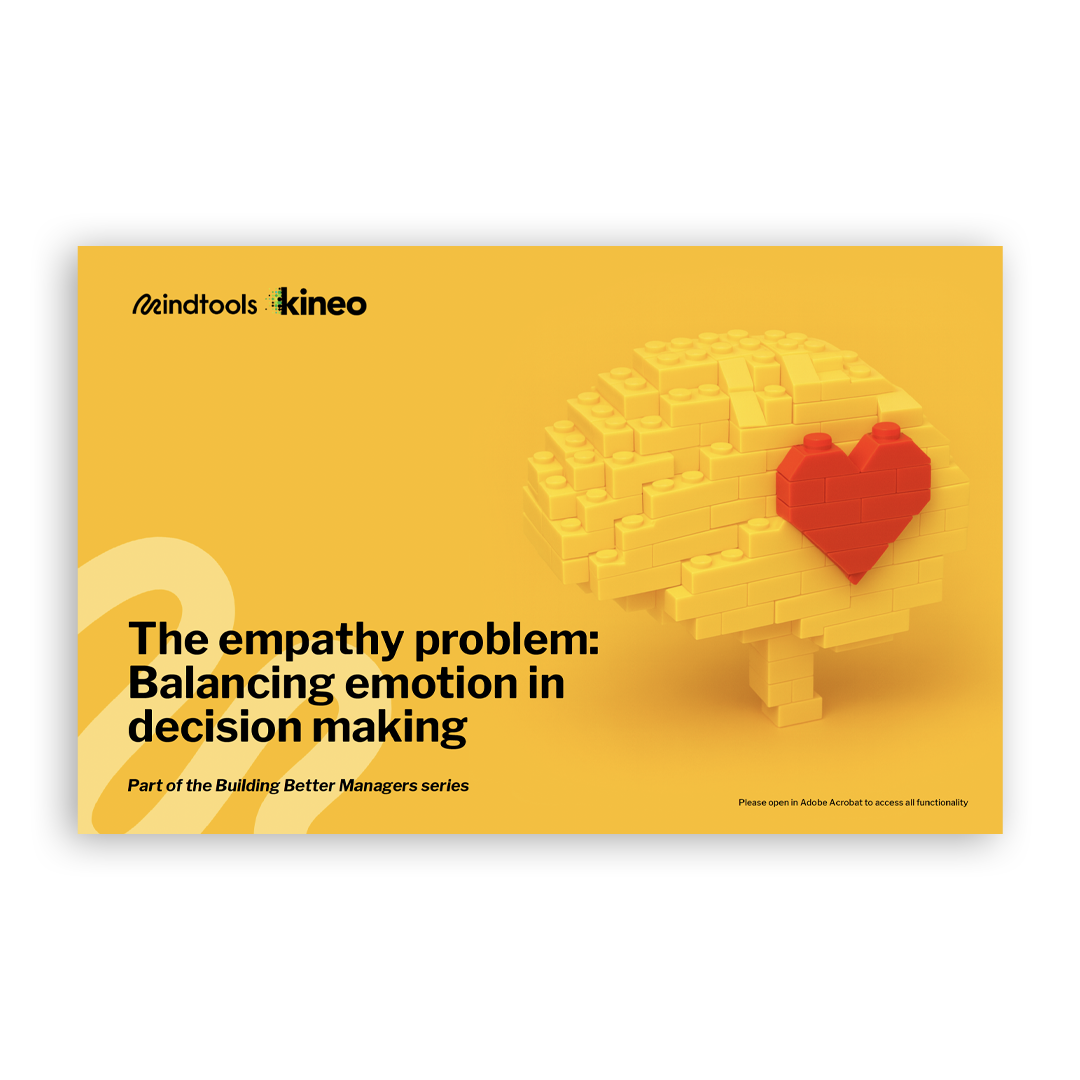
Four in five managers underestimate emotional bias in their decisions
Global research from Mindtools and Kineo uncovers hidden biases in managerial decision-making and offers practical strategies to improve workforce outcomes.
- 4 in 5 managers believe that they make decisions without being influenced by other people’s feelings, yet interviews uncovered personal stories that revealed most are intuitive and emotionally driven
- Empathy has a ‘curvilinear effect’ with both too little and too much empathy undermining outcomes
- 58% of managers seek advice from peers when making emotionally charged decisions, which can unintentionally spread biases.
According to new global research from Mindtools and Kineo, managers are less rational and more influenced in their decision making than they think. The study, The empathy problem: Balancing emotion in decision-making, part of the Building Better Managers series, surveyed 279 people leaders across eight countries and 51 industries*, with qualitative interviews assessing how emotions and biases impact workplace choices.
While 4 in 5 managers reported making decisions without emotional influence, almost all shared personal stories during interviews that indicated the opposite. This gap reflects the unconscious nature of decision making. While humans see themselves as rational thinkers, many of our choices are instinctively fast, intuitive and emotionally driven. Therefore, we often don’t realise how much emotional bias interferes with our actions.
Indeed, Mindtools and Kineo’s research found that managers heavily relied on peer support when solving emotionally charged challenges. For instance, 58% of managers seek advice from other managers when trying to improve working relationships, resolving conflicts or having difficult conversations. Although peer support is valuable, according to Mindtools and Kineo it is not the most reliable way to make decisions, bearing in mind every manager has unique experiences and biases that create different interpretations.
Anna Barnett, PhD CPsychol, Head of Research and Insights at Mindtools and Kineo, said:
“Managers want to see themselves as rational thinkers, but emotion is integrated into almost every decision they make. Whether evaluating pay grades, team conflict, or delegation, bias will play a role no matter how detached we intend to be. Therefore, acknowledging that bias is inherent in our decisions is a vital move towards making fairer, more practical decisions that improve workforce dynamics.”
The study also reviewed empathy’s impact on managerial decision making. While empathy has been acknowledged as an essential leadership skill in recent years, a curvilinear effect was discovered, with both too little and too much empathy undermining team outcomes. Managers with very high levels of emotional empathy were less skilled at building trusting relationships with their teams and less skilled at delegating to them, in part because they are more likely to over-identify with their team’s personal challenges and struggles.
These findings are reinforced by broader evidence on emotional heuristics - the shortcuts managers can use when making decisions under pressure. Prior studies have shown heuristics, like pausing to reflect, prioritising people before tasks, or handling conflicts privately, can counterbalance emotional bias and improve business outcomes.
Barnett concluded: “The study demonstrates that emotional intelligence is critical to good leadership. Removing emotion from decisions isn’t the answer or a possibility. Instead, managers need to reflect on their judgements and how emotions influence their decisions. With the right balance and acknowledgement of biases, leaders can make fairer decisions that help employees grow and succeed."
Download the full research report: The empathy problem: Balancing emotion in decision-making.
About Mindtools and Kineo
Mindtools, a global management and leadership skills development provider, acquired Kineo, a global provider of workplace learning solutions, from City & Guilds in May 2025.
*Research methodology
The data presented in the Mindtools and Kineo report was collected between May and June 2025. A total of 279 people leaders participated in the research, evenly split between women (50%) and men (50%). Participants were based across eight countries: Australia, Canada, France, Germany, India, South Africa, the United States, and the United Kingdom.
Participants represented private, public, and nonprofit sectors, spanning 51 industries, including finance, banking and insurance, construction, manufacturing, education, healthcare, hospitality, IT, research, retail, marketing and advertising, and real estate. Over half of participants (56%) worked in organizations with more than 1,000 employees, and 29% were employed in organizations with over 10,000 employees. Nearly two-thirds of organizations (62%) had been established for more than 20 years. People leaders surveyed managed teams ranging from 1 to more than 20 employees.
In the study, participants completed an online survey and the Manager Skills Assessment – a proprietary tool designed to measure 12 core management skills. In addition, 57 participants took part in a one-hour follow-up interview to explore their experiences and perspectives managing people in greater depth.
Much of the data in this report is summarized as percentages but we have also performed advanced statistical tests to understand the relationships, differences and patterns we’ve observed. The claims and predictions we make in our reports are based on statistical significance, for which we use a p-value of .05 as our cut-off. This means that there is less than a 5% probability that the results we observe are random (and, therefore, a 95% probability that we’ve stumbled on something pretty important!). Some of the statistical tests we have used in this research include:
- Cronbach’s alpha
- Correlation
- t-test
- ANOVA
- Linear and multiple regression
To perform these tests, we have used the statistical software package R. If you have any questions or would like to know more about how we have analyzed our data, please contact us directly.
Where other research has been cited in the report, we have included full references in the footnotes with accompanying links to each source. Mindtools’ earlier reports, one of which we draw from in this report, can be found on our website: https://www.mindtools.com/business/research/


